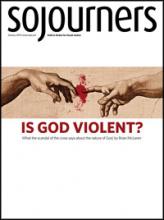Even before last fall's reboot of the peace process, Israeli and Palestinian headlines recycled variations on the theme, "What will happen when the talks fail?" Official spokespersons dutifully countered with optimistic clichés. But as the process drags along, on-the-ground skepticism remains.
West Bank Christian Daher Nasser expresses a widespread grassroots opinion: Governments don’t make peace, people do. Though surrounding Israeli settlements threaten to confiscate his family's land, he has invited Orthodox Jews from those same settlements for tea and sponsored soccer games between Palestinian and Israeli children. A stone at the farm’s entrance bears the painted slogan, "We refuse to be enemies," even though Israelis have bulldozed hundreds of his olive trees. His response? Plant hundreds more.
But can isolated acts of nonviolence create lasting peace? After an East Jerusalem screening of the documentary film Budrus, one of the producers, Rula Salameh, acknowledged that localized successes of Palestinian nonviolence have yet to coalesce into a comprehensive, disciplined movement. Though demonstrations have been successful at altering the path of the Israeli "separation barrier," sometimes organizers cannot prevent youths from throwing stones. Salameh and others confirm that many older Palestinians who've "paid the price" for participating in past violence admit that such methods harmed all sides, and that nonviolence is a better way.
Read the Full Article
